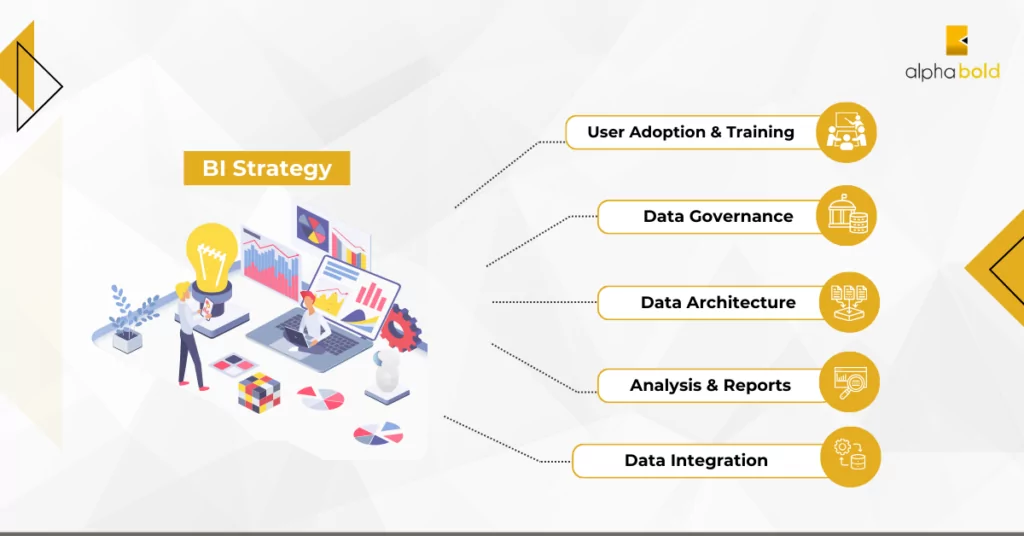Introduction
In the midst of the digital transformation, organizations are flooded with vast data quantities. However, the challenge lies not in data acquisition but in harnessing its real-time insights for timely decision-making and competitive advantage. An effective Business Intelligence (BI) strategy becomes crucial to tap into this data’s true potential. This is underscored by a projection from Finances Online, indicating that by 2024, the BI software market is set to soar to an impressive $17.6 billion, highlighting the growing reliance on and significance of BI in our data-centric world. This blog will unravel the BI strategy concept and explore its relevance in today’s data-driven landscape.
What Is A Business Intelligence Strategy?
A business intelligence strategy outlines how a company will use data analysis and other BI tools to gain insights and make informed decisions. It involves defining goals and objectives, identifying data sources, determining which metrics to track, and establishing processes for analyzing and reporting on data.
A BI Strategy Typically Includes The Following Components:
- Data governance: Establishing rules and processes for data quality, security, and compliance.
- Data architecture: Defining the structure and design of data systems and infrastructure, including data warehouses, data lakes, and data marts.
- Data integration: Identifying data sources and developing processes to unite data in a unified view.
- Analytics and reports: Identifying the key performance indicators (KPIs) to track, developing dashboards and reports, and using data visualization tools to present insights.
- User adoption and training: Developing training programs and support resources to ensure employees effectively use BI tools to make informed decisions.

A BI strategy helps organizations understand their data better, make more informed decisions, and gain a competitive advantage in their industry.
So, is a Business Intelligence Strategy Essential for Your Organization?
To determine the necessity of a Business Intelligence (BI) strategy, executive leaders must assess several critical factors. Foremost among these are your organization’s overarching goals. Are you aiming for rapid growth, enhanced operational efficiency, or perhaps securing a more robust competitive edge? Your answer will illuminate the degree to which a BI strategy can be a game-changer for you.
Moreover, consider your organization’s data maturity. Where does your enterprise stand regarding data collection, integration, analysis, and visualization capabilities? Companies still in the nascent stages of their data journey might initially focus on data integration and governance. Conversely, those at a more advanced stage might emphasize “Harnessing the Power of Data” to derive more profound, actionable insights.
The competitive landscape further complicates this equation. In today’s dynamic business environment, with ever-shifting market trends and consumer behaviors, organizations are in a perpetual race to stay ahead. How do you measure up against your adversaries? Are they leveraging advanced analytics, AI, or machine learning to outpace you? If so, “Gaining a Competitive Edge” through a well-executed BI strategy becomes advantageous and imperative.
Furthermore, as the “volume and complexity of data” burgeon, the absence of a structured BI strategy can leave organizations grappling in a data deluge, deprived of meaningful insights. This is not just a challenge for large corporations; businesses of all sizes are inundated with vast arrays of data. A BI strategy acts as a lighthouse, guiding them towards extracting the true essence of this data, facilitating “data-driven decisions,” and ensuring they remain agile and responsive in an “ever-evolving business landscape.
Benefits of Business Intelligence Strategy:
A BI strategy goes beyond simply collecting and storing data. It is a comprehensive way to use data strategically. But is it necessary for all organizations? Let’s explore further to find the answer.
- Amplifying Strategic Data Utilization: In today’s data-driven environment, a mere accumulation of data doesn’t suffice. Business Intelligence (BI) transcends this by offering a meticulously crafted pathway to leverage data strategically. For C-level executives striving for organizational excellence, understanding the profound implications of BI becomes indispensable.
- Capitalizing on Data-Driven Insights: For visionary leaders, data is not just an asset – it’s a goldmine of insights. BI doesn’t let this goldmine become an overwhelming influx of raw information. Instead, it carves a clear path, allowing leaders to extract actionable intelligence, spot emerging trends, drive innovation, and propel organizational growth.
- Securing Competitive Superiority: Maintaining an edge is paramount in the rapidly evolving corporate landscape. An adeptly implemented BI strategy gives organizations insight into market flux, consumer patterns, and adversaries’ moves. Equipped with these insights, you can recalibrate your tactics, seize emerging opportunities, and consistently remain at the forefront of your industry.
- Streamlining Operations & Bolstering Efficiency: Operational prowess is the linchpin of corporate giants. BI serves as a catalyst, refining processes, pinpointing inefficiencies, and bolstering operations. By delving into KPIs and operational metrics, you can unveil avenues for enhancements, curtail expenses, and amplify productivity, leading to optimized resource allocation and elevated operational excellence.
- Proactive Risk Management: Astute risk management is non-negotiable in today’s volatile business climate. BI furnishes you with tools to surveil, discern discrepancies, and forecast potential hazards. Leveraging historical analysis and predictive analytics can avert threats, reinforce compliance, and safeguard your esteemed organizational reputation.
- Future-Proofing & Scalability: An organization’s growth trajectory demands concurrent data evolution. A robust BI strategy ensures you’re keeping pace and leading the charge. It preps your enterprise for burgeoning data demands and the integration of emergent technologies, forming a bedrock for advanced analytics, AI, and machine learning. This positions your organization to harness next-gen technologies for superior insights and strategic decision-making.
Unlock the Power of Your Data!
Dive deeper into actionable insights with our BI specialists.
Request a ConsultationChallenges in Implementing a Business Intelligence Strategy
Implementing a Business Intelligence (BI) strategy is no simple endeavor, especially when companies decide to navigate this complex process independently. Data management is one of the most prominent challenges arising from the very heart of BI. With overwhelming data, companies often grapple with organizing, processing, and making sense of it. This sentiment is echoed by a startling statistic from Trust Radius, which reveals that up to 74% of employees feel overwhelmed or are unhappy when working with data.
Beyond data management, there’s the challenge of integrating various data sources. Without expert guidance, organizations can struggle to consolidate disparate data streams into a unified and cohesive view, making it difficult to derive actionable insights. Another hurdle is selecting and deploying the right BI tools and platforms. The BI market is flooded with myriad tools, each promising exceptional results. Choosing the right ones that align with an organization’s unique needs and scaling them can be daunting without seasoned expertise.
Further complicating matters is the need for ongoing training and support. Continuous training becomes imperative as BI tools evolve and the company’s data needs change. However, ensuring that every employee is adept and updated can be challenging without a dedicated team or expertise. Lastly, there’s the concern of data security and compliance. Handling sensitive data brings the responsibility of safeguarding it against breaches and ensuring it meets regulatory standards. Companies risk exposing their critical data to vulnerabilities without specialized knowledge in BI security protocols.
Optimizing Business Intelligence Strategy with Experts: Key Steps for Success:
In today’s digital business landscape, extracting value from data has become paramount. As such, partnering with seasoned BI service providers can drastically improve how organizations approach, develop, and employ their Business Intelligence strategies. These specialists bring a wealth of experience, tailored solutions, and industry best practices to the table, ensuring not only the optimization of BI initiatives but also the alignment of these initiatives with core business objectives.
Collaborate to Define Clear Objectives and Key Performance Indicators:
Leveraging the expertise of a BI services provider can enhance the foundation of a successful BI strategy. Organizations can seamlessly align their BI efforts with overarching business aspirations by defining clear objectives and key performance indicators (KPIs). By partnering with a BI specialist, businesses can sharpen their data analysis focus, ensuring the BI initiatives yield impactful results, whether it’s augmenting sales revenue or elevating customer satisfaction. In collaboration with a BI service provider, KPIs allow organizations to gauge progress and evaluate the strategic BI influence on business results.
Seek Guidance to Select and Implement the Best Technological Fit:
BI service providers excel at identifying the ideal technology stack crucial for an optimal BI strategy. Their expertise ensures that businesses select tools and platforms that resonate with specific requirements and ambitions, from data integration tools to advanced analytics solutions. With the help of a BI services provider, the technology gets tailored to an organization’s unique data sources, operational workflows, and reporting necessities. These experts ensure the chosen tech is scalable, intuitive, and competent at managing your data intricacies.
Harness Expertise to Craft a Robust Data Integration Strategy:
Data integration stands paramount in BI. With a BI services provider’s know-how, organizations can craft a potent data integration strategy addressing data collection, refinement, transformation, and storage. This often means consolidating data from diverse sources, fortifying data consistency, and fostering a cohesive data view for profound analysis. Such a strategy, developed in collaboration with BI specialists, guarantees access to pertinent and trustworthy data for pivotal decision-making while offering a comprehensive organization data panorama.
Enable Self-Service Analytics with External Support:
The prowess of a BI services provider can be pivotal in equipping business personnel with self-service analytics tools. Their assistance ensures organizations deploy intuitive BI tools, permitting even non-tech users to delve into and decipher data autonomously. Moreover, the training and support stemming from these providers are invaluable, instilling user confidence and mastery over BI utilities. This nurtures a data-centric organizational culture and diminishes reliance on IT departments, paving the way for prompt, informed decisions.
Partner for Continuous Monitoring and Performance Evaluation:
Consistent oversight and assessment of the BI strategy’s efficacy, especially with the assistance of a BI services provider, are vital. Their expertise aids organizations in formulating performance benchmarks and routinely measuring advancement against these metrics. This involves KPI scrutiny, user engagement rate analysis, and gauging the influence of data-inspired insights on business dynamics. Such perpetual evaluations, in tandem with a BI specialist, reveal enhancement avenues, guide adjustments, and assure the BI strategy’s continued relevance. Moreover, it’s a pathway to showcase the BI investment’s ROI to all stakeholders transparently.
AlphaBOLD’s Business Intelligence Services:
At AlphaBOLD, we pride ourselves on being that pivotal partner. Our team is dedicated to assisting companies across various industries tackle modern business challenges through data-driven BI solutions. Our core mission? To empower organizations with actionable insights that significantly influence planning and decision-making processes. Whether it’s managing vast data troves, predicting upcoming market trends, or leveraging Enterprise Data Warehousing Services, Data Optimization, Data Analysis, or Big Data, our BOLDEnthusiasts are committed to guiding you every step of the way. With AlphaBOLD by your side, you’re not just getting a service provider; you’re gaining a trusted ally in your BI journey, ensuring that your strategies are effective and ahead of the curve.
Take your Business Intelligence to the Next Level!
Discover how AlphaBOLD can elevate your BI game.
Request a ConsultationConclusion:
Today, data is both a challenge and an asset. As we’ve explored, the true potential of this vast data reservoir can only be unlocked with a strategic approach to Business Intelligence (BI). While the journey of BI implementation comes with its unique challenges, the benefits are undeniable: enhanced decision-making, competitive positioning, operational efficiency, and more. But navigating this landscape needn’t be overwhelming. With the right expertise, such as that offered by AlphaBOLD, businesses can confidently sail through the tides of data challenges, harnessing the true power of their information. As we look ahead to a future where data-driven decisions become the norm, ensuring your organization is equipped with the right BI strategy is paramount. Ready to embark on this transformative journey? Let AlphaBOLD be your guiding star. Reach out to us today and chart a course to BI excellence.
Explore Recent Blog Posts








